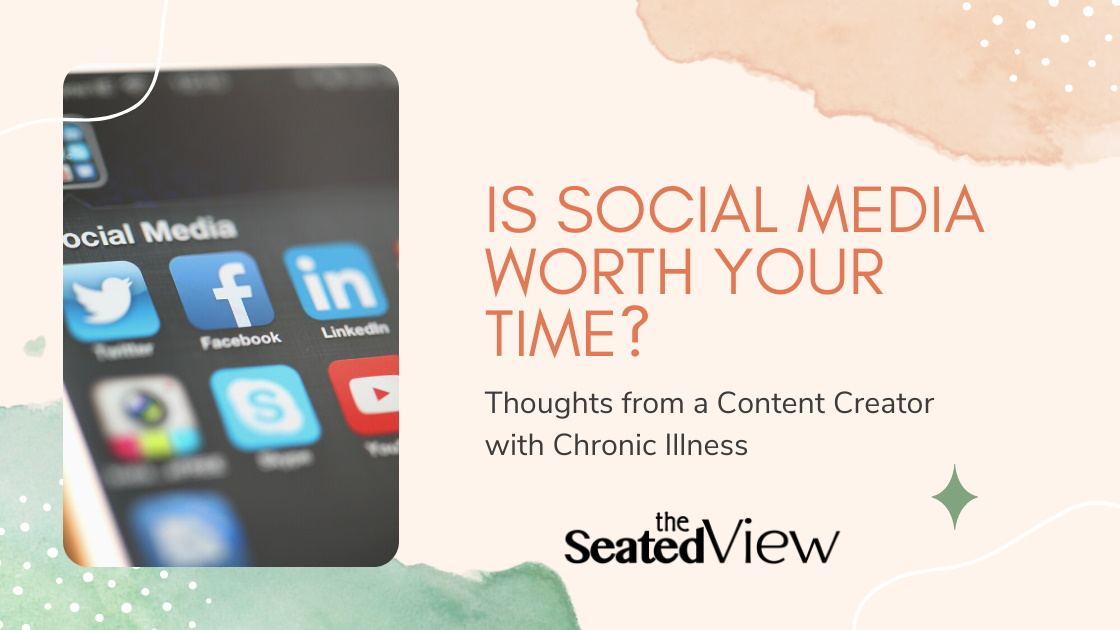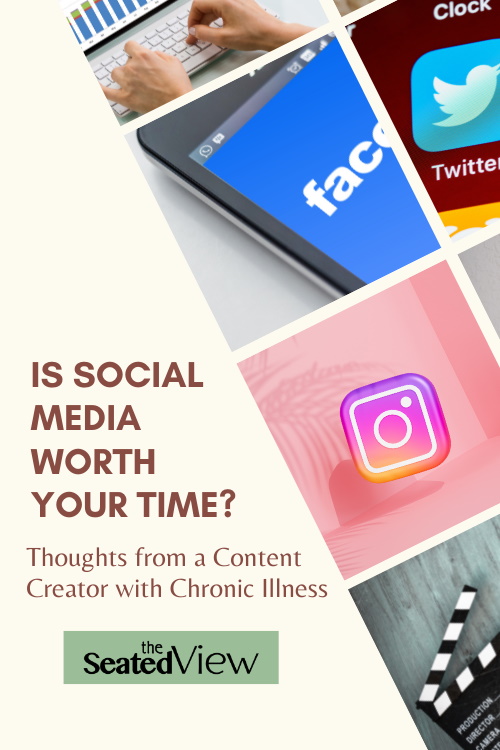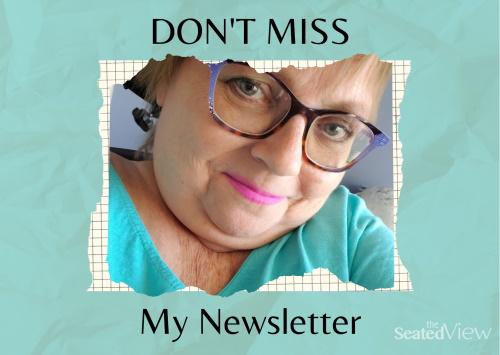Is Social Media Worth Your Time? Thoughts from a Content Creator with Chronic Illness

When I first started on social media you could reach your audience with a reasonable amount of work, steadily building your account. This is no longer the case. In fact, it is becoming almost impossible to be found on social media, even by the people who have liked or followed your account. Now, with a similar amount of work, you can expect about 10% (or much less depending on platform) of your followers to be served your content. This affects everyone but hit harder on people like me, creators and advocates with chronic illness who often have much lower energy levels than their healthy peers. Is social media no longer worth your time?
I have spent a long time pouring more energy and time into social media, with ever-increasing frustration. A few months ago, I had an epiphany about social media:
Twitter makes me angry. There are a lot of great people and communities in Twitter, but it’s really hard to see their posts in the rage-fueled tweet storms.
Instagram makes me feel excluded. It’s almost impossible to be found if you don’t make reels. As a disabled creator reels are difficult for me to make, leading to an erasure of my content and that of others like me.
Facebook exhausts me. Algorithm changes means my posts do not reach the people who’ve liked my page or, on my personal account, my family and friends, no matter how hard I try.
Tik Tok makes me feel excluded (see video comment from above).
And I’m not alone. Many other content creators are having a really hard time on social media. Reach data tells the story.
Current average percentage reach on social media apps
I did a bit of digging into organic performance, that is, the percentage of people who’ve Liked or Follwoed your account see posts without you buying ads. Here’s what I found for some of the main social platforms:
Facebook — expect your posts to reach 1-6% of your audience. Videos posted directly to Facebook are prioritized and posts containing links are hidden. Facebook wants you to stay on Facebook.
Instagram — the app has changed to prioritize videos, such as reels and IGTV. Estimates indicate that your posts will reach approximately 16% of the people who like your account, especially if you post a lot of videos. I don’t and based on my experience, the percentages are much less.
Twitter — a tweet is visible for 35-60 seconds. Visibility period can be extended a little by using hashtags.
Tik Tok — reach is hard to estimate, especially for smaller accounts. One article noted that in order to be visible on this app, you should post 1-3 times a day.
Considering how much effort it takes to create content, these are discouraging numbers. More on that in a moment.

My experience: a social media case study
Given the changes in algorithms, should you just work harder on social media?
Well, that assumes two things. One, that you have that extra time and energy to spend on social media or extra money to hire someone to do it. As someone who is constantly struggling with chronic illness fatigue, that’s increasingly not the case. I also don’t have the funds to hire a dedicated social media manage. The second problem? The algorithm.
And yes, you should read that word while imagining horror movie music.
[giphy]
I have twice spent a lot of time nurturing my Facebook page to a healthy reach and it was wonderful. I created a vibrant community, people saw my posts, we had fascinating conversations and what I did was useful to others. It’s exactly why I am an advocate and writer.
And then Facebook made a massive change to the algorithm. The first time, I put in the work to gradually build up my page again and reminded myself that we should expect the app to tinker with things. How bad could it get?
It turns out quite a lot.
The second time Facebook rolled out a major algorithm change (within the last year or so) I had a catastrophic loss of audience. Overnight, I lost 80% of my reach. This was devastating on a personal level as I lost my ability to connect with my community. It was also disastrous on a professional and financial level, impacting my ability to sell books and deliver as a freelance writer.
But it is also worrisome from the point of view of the Facebook user. This algorithm change meant that 80% of the people who Liked my page no longer saw my posts in their feed. As someone who also uses Facebook to find information and community, it’s deeply frustrating to no longer see posts from the accounts and people to whom I’m connected. And don’t forget, this also applies your personal account.
Want to be sure to get news on what I do? Sign up for my newsletter.

Does the current social media business model provide ROI?
I can’t help but wonder whether the social media model is broken, that perhaps companies have stopped lost sight of the value they should provide to the user. I understand that ads are necessary when the app is free. I also understand the need for constant adjustments to the algorithm to enhance user experience as well as driving traffic to the parts of the app that make money for the owner of the platform.
But if a particular product does not give users a return on investment (ROI), people will stop buying it. This works in the stock market and on social media. My investment in social media as a brand and a user is twofold. I invest my time and possibly my money for ads. If I do not get a satisfactory return on that investment — on either end — I will go elsewhere.
In the past, I have boosted posts and used ads to build my community. As an advocate and a (very) small business owner, I don’t have a big budget, but it was possible to get some bang for a relatively modest buck. Now, if I want the same result I have to invest hundreds and possibly thousands of dollars. I don’t have that kind of budget, so I am no longer buying ads.
Likewise, I have reduced the time I spent on social media, instead of using much of what I call my Community Spend (i.e., time) on my newsletter. I’m sure this makes no difference in ad revenue for the platforms, but… I am also seeing this in much larger companies. Previously vibrant Facebook pages now receive only cursory attention from their owners.
In the words of Hank Green, “the weight got too heavy for the support that I had to carry it.”
In order to receive repeat business, any product or service must earn your business and your loyalty. When they don’t, they lose their customers. This may be hard to believe for the large social media companies who have millions or billions of users, but the trickle has started. Instead of making adjustments to increase ROI, Facebook is rolling out more new products — video, podcasts, etc. — that will initially be prioritized so people use them but will inevitably be the victims of the same model: pay up or your posts will disappear.
In an attention economy, users and audience are currency. If I can’t reach my community, audience or customers on a particular platform, I will find another way. When enough people do that, a social media company will become irrelevant.
Maybe it’s time they remember this.
Read More
Discover what else I've been writing about...















